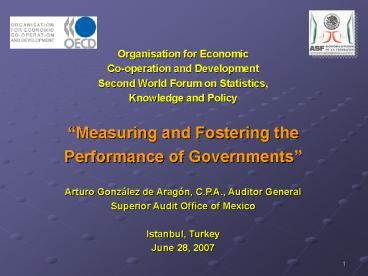Sistema de Evaluacin al Desempeo basado en Indicadores - PowerPoint PPT Presentation
1 / 23
Title:
Sistema de Evaluacin al Desempeo basado en Indicadores
Description:
Heads of the Supreme Audit Institutions (SAIs) of the People's Republic ... Supra-national key indicators. Comparative assessment 'Millennium Development Goals' ... – PowerPoint PPT presentation
Number of Views:58
Avg rating:3.0/5.0
Title: Sistema de Evaluacin al Desempeo basado en Indicadores
1
Organisation for Economic Co-operation and
Development Second World Forum on Statistics,
Knowledge and Policy Measuring and Fostering
the Performance of Governments Arturo González
de Aragón, C.P.A., Auditor General Superior
Audit Office of Mexico Istanbul, Turkey June 28,
2007
1
2
Introduction
- Valuable opportunity to debate
- Meeting in Palermo, Italy (2004)
- Making Governments Accountable
- Heads of the Supreme Audit Institutions (SAIs) of
the Peoples Republic of China, India and Japan,
and a representative from the New York Times - Performance assessment system
- Universally accepted key indicators
2
3
Governmental Accountability
- Modern supreme auditing performance analysis
and goals objectives fulfilment assessment - Criteria
- Efficacy
- Efficiency
- Economy
- Accurate and precise indicators to assess
governmental management
3
4
Supreme Audit Institutions and Indicators
- Supreme Audit Institutions ? foster performance
assessment systems - Lack or insufficiency of indicators
- Search for techniques and resources to conduct
revisions and support observations - External references ? natural option
4
5
INTOSAI (1)
- International Organization of Supreme Audit
Institutions (1953) - 186 member countries
- Increase of technical capabilities
- Experience and information exchange
- Performance audits
- Performance Assessment System
6
INTOSAI (2)
- Institutional effort to define criteria and a
legal framework to carry out performance audits - XIX INTOSAI Congress
- Debate on a Performance Assessment System based
on Universally Accepted Key Indicators - Mexico City, November 2007
6
7
Indicator Systems
- Key Indicator System
- Essential tool for SAIs
- Definition of vulnerable national areas
- Adequate public policies design strategy to
address national issues - Better public resources allocation
7
8
Indicators Nature
- Identification of their nature
- Quantitative
- Qualitative
- Quantitative data objective indicators hard
data - Information expressed in figures
- Standardization
- Qualitative data subjective indicators
perception - Thorough description of events, situations,
behaviours, ideological positions, etc.
8
9
Key Indicator System
- Quantitative and qualitative data weighting
- Public policies design
- Measurement and improvement of governmental
performance - Transparency and sound governmental practices
- Current situation and future trends
- Risk areas and improvement opportunities
- Corrective and preventive measures to ensure
attainment of foreseen goals and objectives
9
10
International Benchmarking
- Supra-national key indicators
- Comparative assessment
- Millennium Development Goals
- 48 indicators
- Structural indicators of the European Union
- Six strategic areas (economy, employment,
research, economic reform, social issues and
environment)
10
11
Key Indicators System and SAIs
- Three Es to measure governmental performance
- Efficacy
- Efficiency
- Economy
- Three Cs to measure citizenry satisfaction
- Quality of the good or service
- Competence of the actors
- Client - citizen satisfaction
11
12
Superior Audit Office (SAO) of Mexicos Proposal
(1)
- We cannot improve what we cannot measure
- Performance Assessment System universally
accepted key indicators. - PREMISES
- FIRST Public policies design ? indicator system
? short- and long-term goals and objectives - SECOND Comparison between similar public
policies ? best practices ? gap detection ?
improvement programs - THIRD Best practices ? objectives and goals ?
maximum outcome yielding at minimum cost ?
efficiency and efficacy ? outcome attainment
12
13
SAOs Proposal (2)
- TASKS
- INTOSAI OECD Sound governmental practices
- Best practices
- Continuous improvement - Excellence
- Process re-engineering
- Supreme Audit Institutions
- Outcome-focused audits
- Virtuous circle
- Sound practices
- Governance
13
14
SAOs Proposal (3)
- Systematization of available indicators
Political- Administrative
Three societal levels
Economy
Society
15
Political-Administrative
- sound regulatory framework
- guarantees
- civic liberties
- governmental capacity
- governance
- citizenry participation
Political-Administrative
- Indicators
- public order
- legal assurance
- governmental capacity
- governance
16
Economy
- life-quality
- efficient resources allocation
- technological progress
- employment
- fair sharing of produced goods
- environment
Economy
- Indicators
- GDP
- Per capita Income
- Public Debt
- Investments
- Public expenditure
- life quality
- competitiveness
- technological progress
- macroeconomic stability
- employment
- markets
- trade
17
Society
- nutrition
- education
- health
- housing
- poverty line
- culture
- Indicators
- illiteracy and education years
- healthy life years
- infectious diseases uprooting
- housing for all families
- adequate nourishment
- cultural patrimony sharing
- books, magazines, radio, television, theaters,
telephone - information access
Society
18
Existing indicators
- Organization for Economic Co-operation and
Development (OECD) - United Nations Organization (UNO)
- World Health Organization (WHO)
- United Nations Educational, Scientific and
Cultural Organization (UNESCO) - World Trade Organization (WTO)
- World Bank (WB)
- International Monetary Fund (IMF)
- International Transparency (IT)
- Agencies
- rating
- non-governmental for development
- national
19
Conclusions (1)
- Universally accepted key indicator system
- SAIs ? public policies design
- Risk areas. Improvement opportunities
- Governmental performance
- Critical outcomes vision
- Rational public resources allocation
- Transparency and accountability
20
Conclusions (2)
- Key indicator systems ? consensual agreement
- Universal nature ? governmental performance
assessment - Domestic indicators ? national planning systems
design policies regional and sectorial plans
short, mid- and long-term programs, and annual
budgets
21
Conclusions (3)
- Public accountability
- Accountability
- not a gracious concession
- legal, ethical and moral duty
22
- Democracy is the system in which subjects rule,
those who rule are always ruled, and where rulers
and subjects both belong to the one and same
society.
23
- Mr. Arturo González de Aragón, C.P.A.
- Auditor General
- Superior Audit Office of Mexico































